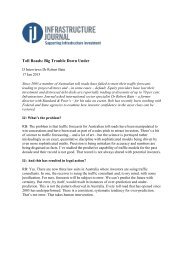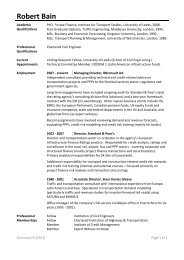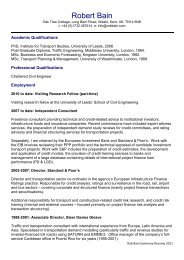Disincentivising overbidding for toll road concessions
Disincentivising overbidding for toll road concessions
Disincentivising overbidding for toll road concessions
- No tags were found...
You also want an ePaper? Increase the reach of your titles
YUMPU automatically turns print PDFs into web optimized ePapers that Google loves.
4 │ INTERNATIONAL PRECEDENT FROM OTHER SECTORS<br />
Outcomes<br />
The outcome of the CIS scheme—in terms of the extent to which it has removed the incentive <strong>for</strong> companies to<br />
overstate their CAPEX requirements—is not yet entirely clear and will only become clearer once the water companies’<br />
outturn expenditures have been observed at the end of the current price control period (in 2015). However, the<br />
continued use of a similar mechanism in the regulation of energy companies (Ofgem’s in<strong>for</strong>mation quality incentive<br />
(IQI) scheme) 122 suggests that there have been benefits.<br />
Applicability to <strong>toll</strong> <strong>road</strong> <strong>concessions</strong><br />
The menu scheme represents an innovative mechanism by which expenditure, or demand, plans can be elicited<br />
by a regulatory authority with a view to encouraging more accurate revelation of these variables. Further research<br />
would be required into the details of how such a scheme could be applied to <strong>toll</strong> <strong>road</strong> <strong>concessions</strong>, but there is<br />
merit in considering a scheme that makes truthful revelation of demand estimates incentive-compatible, possibly by<br />
rewarding companies <strong>for</strong> the accuracy of these estimates.<br />
4.4 International precedent from other sectors: discussion<br />
The case studies presented in this section highlight that concerns surrounding <strong>overbidding</strong> are not confined to the <strong>toll</strong><br />
<strong>road</strong>s sector. In the UK, procurement agencies, such as the DfT and the Radiocommunications Agency, have actively<br />
taken steps to reduce the potential <strong>for</strong> <strong>overbidding</strong>. This has included attempts—<strong>for</strong> example, by holding deposits or<br />
bonds—to increase the penalties <strong>for</strong> defaulting and increasing the level of assessment of delivery plans. The latter<br />
ensures that demand and revenue <strong>for</strong>ecasts are adequately justified and obtainable, and are robust against different<br />
assumptions.<br />
Like <strong>toll</strong> <strong>road</strong> <strong>concessions</strong> (and, in general, large infrastructure <strong>concessions</strong> with equity at risk), the 3G spectrum<br />
auctions involved a scarce resource—with only five licences ever to be issued—and no secondary purchasing market.<br />
The case study suggests that, even if the bidding process is well-designed and efficiency rather than revenue<br />
maximisation is emphasised, scarcity can lead to bids that look high (and possibly resemble <strong>overbidding</strong>). However,<br />
the focus on efficiency in the 3G auction at least prevented the <strong>overbidding</strong> from being more serious—Klemperer<br />
(2002) noted that if the UK government had wished to, it could have raised higher revenues by limiting the number of<br />
licences even further—and, ultimately, all of the licensees are still operating today.<br />
The final case study, on menu-based appraisal, introduces an approach to bid appraisal that could potentially provide<br />
an innovative and effective means of incentivising bidders to provide their best <strong>for</strong>ecast, although it is not currently<br />
widely adopted in procurement. The design of such an approach is beyond the scope of this report, but should be<br />
seen as an area <strong>for</strong> potential future research.<br />
122 Ofgem is the regulator of the energy sector in Great Britain.<br />
57






